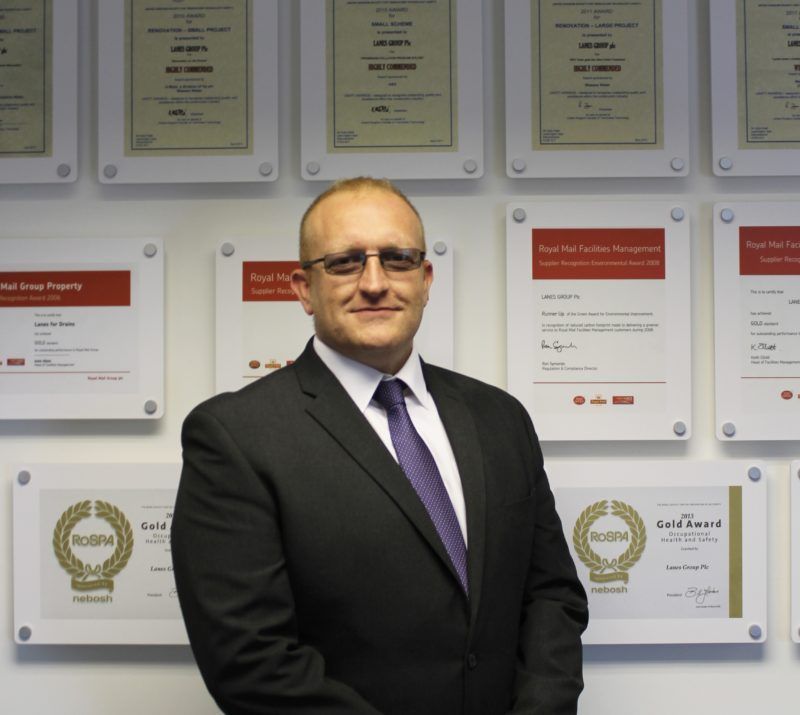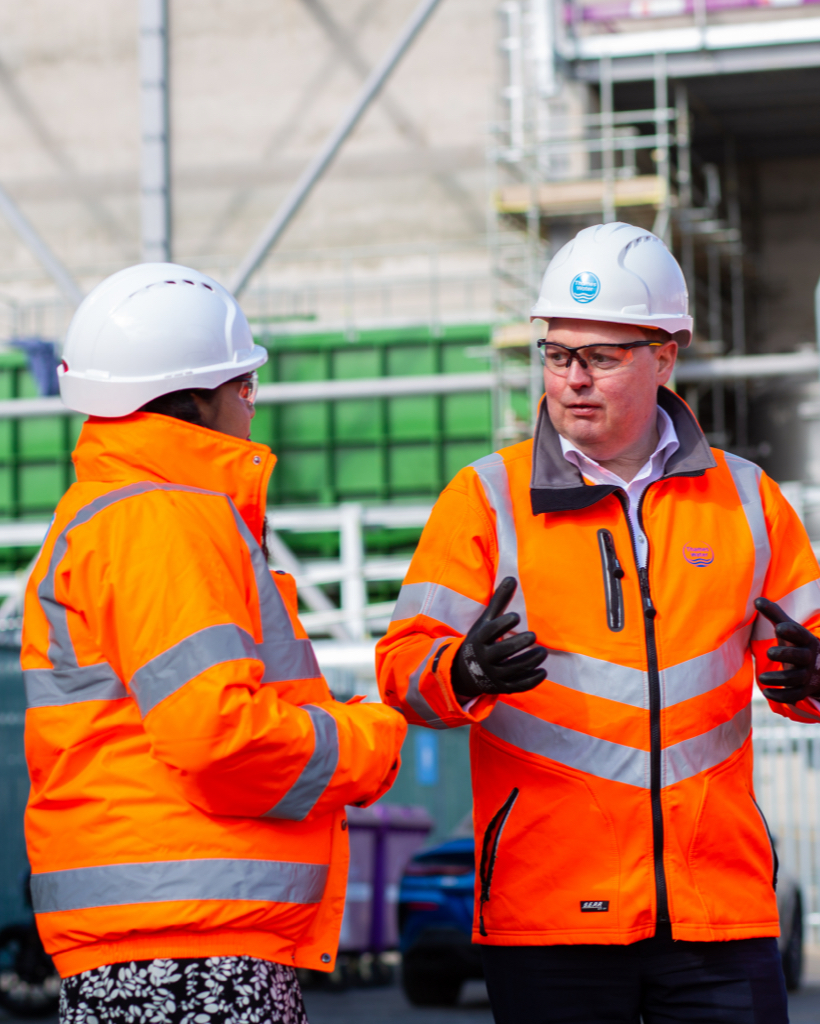What I’ve learned: Careers advice for newcomers to the drainage industry

We’re dedicated to making sure that a fantastic and rewarding career in the drainage industry is more than just a Pipe Dream and that it’s attainable for everyone who starts working in the sector and with Lanes Group.
As a result, we want to give as much advice as possible to those thinking of entering the industry – or those who have just set out on their journey in the sector – and show them there is much more to this job than drains, pipes and sewage.
We recently spoke to Chris Wilde, CCTV Systems Manager at Lanes Group, who has been with us for 17 years in total. He told us all about:
● How he got started in the industry
● How he was able to move up the career ladder
● What advice he’d give to new starters in the industry
● The characteristics he looks for when hiring new team members
● What makes Lanes Group such a good employer
Here’s what he had to say…
———
I first started at Lanes Group when I was 16. My uncle was a plumber and he knew someone at the company, who helped me get a job as an assistant on one of the operational units.
Back then it was a relatively small company, and I started out working as an assistant on a small camera van. We had a trailer jetter that we towed around, to clean and survey drains.
We carried out works in many different environments, including private houses, commercial premises, factories, football stadiums and even prisons. One that comes immediately to mind was a job we attended at HM Prison Leeds in the Armley area. A hole had been drilled through the floor by the inmates and we had to go onto one of the wings with an escort and put a camera down there to make sure there was no escape tunnel.
I also worked on Bolton Wanderers’ stadium during its construction and cleaned and surveyed every drain, including the pitch drainage, so we were among some of the first people to ever walk on that pitch. Another time we carried out works at Manchester City’s stadium whilst it was under construction. The site had been excavated down to the depth of two basement levels and then two foot diameter pile holes were drilled out to around 20 metres further down. These were to be filled with concrete to act as support stilts, but due to the site being in a former mining area, there was concern about old wells or mineshafts and tunnels. We spent months sending the camera down to investigate!
It just goes to show that although this equipment is essentially a camera on a rod, its applications are endless.
The next step on the career ladder
I passed my driving test on my 18th birthday, so when I came back to work, Lanes Group gave me my own van so I could go and carry out jobs on my own. At this point I was working in a team leader role.
A bit later on a position came up as a Rig Manager on the mainline sewer cameras. This equipment is more advanced and technical, so that meant I was given a lot more responsibility.
These cameras are operated remotely from a control unit and the camera is mounted on a robotic crawler, which can be driven up the sewer. The Crawler is attached by an umbilical cable, which provides the necessary power and controls. A pan and tilt camera head can also inspect incoming connections and any defects. Reporting software is used to generate detailed reports using an on-board computer.
It was around this time that Lanes Group put me forward to attend the WITA D20 pipe coding course down in Swindon. The course had a very small pass rate and I was one of the youngest to attend and pass the course first time. Today’s equivalent is the OS20X but I have since upgraded my qualification to the more recent 0S30X.
After a couple of years, I was offered the chance to work at a different company and move up the career ladder again. Because I was very ambitious and I wanted to push myself, I took the opportunity. Over the next six years, I was given more responsibility as a storeman and in time progressed into office roles starting as a job co-ordinator and continuing to climb further up the ladder where I finally held the position of Operations Manager, with 96 people reporting directly to me.
At this point I moved back to Lanes Group into a project management position and over the last seven years have managed to progress into my current senior management role.

What advice would you have for people starting in the industry?
Firstly, I think it’s important to learn as much as you possibly can and be willing to constantly develop. I love to learn new skills and I have been able to do this at Lanes by attending over 80 different training courses, all of which have been instrumental to my personal development.
Traditionally in this industry typically people would choose one discipline – for example, cameras, jetting, relining or excavation – but I think if you’re multi-skilled then it gives you the best possible chance of building a great career for yourself. There’s much more opportunity to make yourself useful and, therefore, move ahead. Plus, the knowledge and experience gained by performing multiple roles has helped my management career immensely.
Being flexible is also crucial. I always look for people who are willing to go with the flow – because change is constant.
Drainage service isn’t a 9 – 5 industry – you might be out the door at 7am but then out working until midnight on some days. So a willingness to do adapt is very important.
So is a willingness to do a great job and offer a great service. For example, arriving at a customer’s house at 7pm to clear a blockage after a hard day’s work and still being able to be enthusiastic shows great character. The last impression they want to get is that you’re not enthusiastic – their world has probably been turned upside down with a lack of basic facilities and possibly foul waste flooding and they need to know they can depend on you.
Attitude is more important than skills
Skills ultimately are not as important as your character. What I’ve learned over the years is that our industry is full of people from all walks of life and we can train them up to a very high standard.
Sometimes people come to us with no formal qualifications or lower than average reading and writing abilities and even dyslexia, but we never write them off. In fact, we support them fully. We can train them up to do a great job and be trusted to operate and maintain state of the art equipment that can cost upwards of £500,000. But only if their attitude is right.
Why is Lanes a good employer?
There are obviously many different levels at which a Lanes employee might sit, meaning the benefits and perks will be completely different for each person at each level of seniority.
But in my opinion, the flexibility of the job is one of the best things. At my level, if I need to drop the kids off at school then I can do that, as long as I’m doing my work, getting to my meetings and making everyone happy. Work/life balance is very important to Lanes Group and that is just one of many great benefits of working for the company.
I also am very lucky to be provided with and utilise state of the art computers, software and equipment. As market leaders in our sector, Lanes has invested heavily in the best tools to do the job.
Another fantastic perk of the job is the travel. As Lanes Group has nationwide cover with lots of individual operating centres, I’ve visited and worked in lots of different places with Lanes and spent time in many cities and towns that I otherwise wouldn’t have been able to go to. I have even managed to travel abroad to different countries as part of my role.
One particular place I am very fond of is Aberdeen; I was seconded to this depot for a little over a year. When I arrived at the Aberdeen’s office door on the first day, I was quite nervous and I didn’t know anyone, but because it was a Lanes office I knew how it was going to work and the kinds of people I’d be working alongside. When I got in there, I was immediately made to feel at home and was quite sad to leave that secondment. But they gave me a great send-off which I’ll never forget. I’ve made some great, long-lasting friendships across the whole of the UK thanks to this job.
You may also be interested in:







